Interview With Laraine Herring
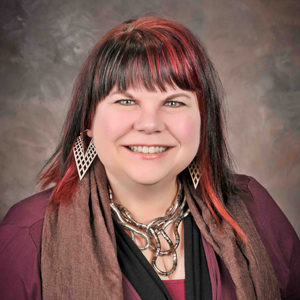 Laraine Herring is an amazing writer, visual artist, and champion of women–especially women over 40! Her latest book A Constellation of Ghosts: A Speculative Memoir with Ravens is a gorgeous, powerful memoir about grief and growth. You can see some of her stunning artwork alongside the interview. Laraine is also a wonderful teacher and psychotherapist who, through her writing and work, has guided many people through grief (me included). I am so grateful to know Laraine and, now, to introduce her to you!
Laraine Herring is an amazing writer, visual artist, and champion of women–especially women over 40! Her latest book A Constellation of Ghosts: A Speculative Memoir with Ravens is a gorgeous, powerful memoir about grief and growth. You can see some of her stunning artwork alongside the interview. Laraine is also a wonderful teacher and psychotherapist who, through her writing and work, has guided many people through grief (me included). I am so grateful to know Laraine and, now, to introduce her to you!
Diane: Congratulations on the success of A Constellation of Ghosts: A Speculative Memoir with Ravens! Tell us a little about it—and about what speculative memoir is.
Laraine: Thank you!
The tagline for A Constellation of Ghosts is, “I was busy doing other things when cancer came, and my father, thirty years dead, returned to me as a raven.”
This book is an exploration of intergenerational trauma, ancestral grief, my own personal grief for the loss of my dad when I was 19, and my way of meeting my colon cancer diagnosis.
“To Me, Speculative Memoir Is Memoir in which Some of the Elements Are Imagined, and Through That Imagined Aspect, the Greater Truth of the Memoir Is Able to Be Reached”
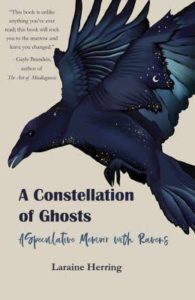 I don’t have the definitive answer to what speculative memoir is. I think it can be many different things. It was, as best I know, originally used as part of disability poetics—a way for people to write about illness and neurodivergence and other ways of being in the world. To me, speculative memoir is memoir in which some of the elements are imagined, and through that imagined aspect, the greater truth of the memoir is able to be reached. So for example, in Constellation, my father takes the form of a raven. This did not literally happen, but he has haunted me since even before he died. When I was first learning to be a writer, which was about fourth grade or so, he said, “Maybe one day you’ll write my story.” And I took that to heart. He died when he was 46, and he had polio as a young boy which left him unable to fully use his left leg. He was lucky, of course. And also, his life didn’t take the trajectory he had expected, and I felt somehow responsible for sharing his story. By using a talking raven, I was able to get much closer to the relationship with my dad than I would have if I’d have written it “straight on”, and I was definitely able to get closer to grief.
I don’t have the definitive answer to what speculative memoir is. I think it can be many different things. It was, as best I know, originally used as part of disability poetics—a way for people to write about illness and neurodivergence and other ways of being in the world. To me, speculative memoir is memoir in which some of the elements are imagined, and through that imagined aspect, the greater truth of the memoir is able to be reached. So for example, in Constellation, my father takes the form of a raven. This did not literally happen, but he has haunted me since even before he died. When I was first learning to be a writer, which was about fourth grade or so, he said, “Maybe one day you’ll write my story.” And I took that to heart. He died when he was 46, and he had polio as a young boy which left him unable to fully use his left leg. He was lucky, of course. And also, his life didn’t take the trajectory he had expected, and I felt somehow responsible for sharing his story. By using a talking raven, I was able to get much closer to the relationship with my dad than I would have if I’d have written it “straight on”, and I was definitely able to get closer to grief.
“I Feel That Speculative Has Helped Me Claim the Totality of My Voice”
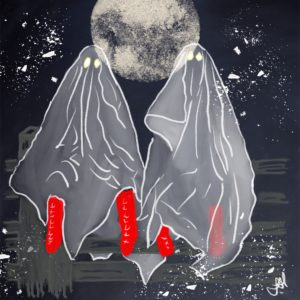 Diane: How has writing speculative freed you?
Diane: How has writing speculative freed you?
Laraine: I have always seen things. Not every day. Not every place. But enough times to where it is part of who I am. I have shied away from expressing that in something I was calling “true” because, well, patriarchy. I am not unique in this, and speculative elements do not have to be ghosts or voices or other “spooky” things. A speculative element in a piece of nonfiction could be a long extended metaphor that turns into something the protag can dialogue with or otherwise engage with. It could be a chapter on “what ifs” or on imagining people’s lives, like your parents’, from before you existed. The key for me is that those elements are grounded in truth. For example, I imagine my mother growing up in Brooklyn in the 1940s. Obviously I was not there. But every detail I used was a detail or a story she told me. I feel that speculative has helped me claim the totality of my voice. It has helped me claim all of who I am.
“I Am Done Trying to Change Anyone’s Mind or Defend My Right to Exist or My Right to Control My Own Body”
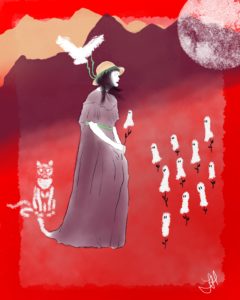 Diane: On your website, you say you’re a feminist, author, lover of cats—in that order. We know a little about the author part. What roles do feminist and lover of cats play in your life?
Diane: On your website, you say you’re a feminist, author, lover of cats—in that order. We know a little about the author part. What roles do feminist and lover of cats play in your life?
Laraine: I began drawing cats when I was very very little. We couldn’t have one because my dad and sister were allergic. I have always connected to cats, and am currently living with one who is my familiar. I had another familiar, an orange cat named Apricot, who arrived in my life the week my dad died and lived 21 years. This cat, Barnessa, appeared in my backyard after my cancer diagnosis. I write about her in Constellations.
I put feminist in the website because I think it is so important to claim that term and not shy away from it. It is not a dirty word. It is not anti-men. It’s also a signal word, and if it keeps people away who don’t like it, that also makes me happy because I am done trying to change anyone’s mind or defend my right to exist or my right to control my own body.
“I Wanted to Write a Book for People of All Ages That Respected and Witnessed the Griever”
Diane: It seems you love animals of all kinds. Brings me to The Grief Forest. Can you tell us a little about that book?
 Laraine: The Grief Forest: a book about what we don’t talk about was a pandemic creation. I returned to drawing in April 2020 because I couldn’t write. I’d already sold A Constellation of Ghosts, and was in between books, but I needed to do something. I have decades of experience working with the energy of grief, and I was very aware of the monumental cultural and societal grief happening—not just due to COVID, but with police brutality, racism, climate grief—so so much. So I started to draw a bunny and I began posting them on Facebook just to share them. My agent saw them and said, “You have a book!” And I said, “Of course not. I’m just drawing animals.” But soon it was obvious that I did have a book, and that I wanted to write a book for people of all ages that respected and witnessed the griever. I didn’t want to write an academic book. I didn’t want to write a “10 steps to address grief” book. I wanted a book that was a companion for grievers. So that’s what I did. Bunny is our protagonist, and she takes us into The Grief Forest, which is a metaphor for the state of bereavement. There, she meets other residents in the form of different animals, who are in various grief experiences. She also walks through the forest with Death, and learns more about how to exist in a world in which death is integral.
Laraine: The Grief Forest: a book about what we don’t talk about was a pandemic creation. I returned to drawing in April 2020 because I couldn’t write. I’d already sold A Constellation of Ghosts, and was in between books, but I needed to do something. I have decades of experience working with the energy of grief, and I was very aware of the monumental cultural and societal grief happening—not just due to COVID, but with police brutality, racism, climate grief—so so much. So I started to draw a bunny and I began posting them on Facebook just to share them. My agent saw them and said, “You have a book!” And I said, “Of course not. I’m just drawing animals.” But soon it was obvious that I did have a book, and that I wanted to write a book for people of all ages that respected and witnessed the griever. I didn’t want to write an academic book. I didn’t want to write a “10 steps to address grief” book. I wanted a book that was a companion for grievers. So that’s what I did. Bunny is our protagonist, and she takes us into The Grief Forest, which is a metaphor for the state of bereavement. There, she meets other residents in the form of different animals, who are in various grief experiences. She also walks through the forest with Death, and learns more about how to exist in a world in which death is integral.
“Grief is Part of Our Human Experience and a Healthy Emotional Expression, and Yet Most of Us Have Never Learned How to Work with It”
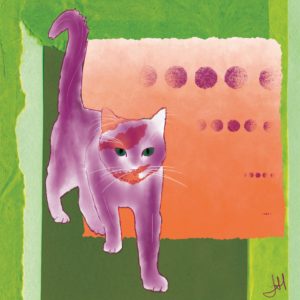 Diane: I’ve had the great fortune to do grief work with you during a particularly difficult time in my life. How did you become interested in grief and grief work, grief writing? How did you develop your program?
Diane: I’ve had the great fortune to do grief work with you during a particularly difficult time in my life. How did you become interested in grief and grief work, grief writing? How did you develop your program?
Laraine: That’s very kind! Like most therapists, I came to psychology because I couldn’t figure out what was going on with me. I was late to it. I didn’t start my grad program until I was 32. But once I began to learn about grief, it helped me understand myself and more importantly, have compassion for myself. I worked with children at a number of grief camps in the area, and I led non-denominational grief support groups. I believe that unresolved grief is at the root of many maladaptive behaviors. Grief is not reserved only for loss due to death. Grief is the normal and natural response to a loss of any kind. Grief is part of our human experience and a healthy emotional expression, and yet most of us have never learned how to work with it. It’s awkward to talk about. But everyone—everyone—will experience it. I also studied expressive arts therapies and narrative therapies, and because I am also a writer, creating a program that merged all those things together came naturally. Drawing and storytelling are fundamental in all of us. You don’t have to be a professional artist or writer. We inherently know how to create narrative. We know how to work with shapes and colors and images. Connecting grief work to play helps the whole process unfold with greater ease.
I believe that each person is their own best guide, and if a program allows for the client to co-create what they need, that empowers the client as well as helps them address their grief in deeper, more compassionate ways. Grief isn’t something to avoid or crush or silence. Grief is something to commune with. Something to listen to. And we can improve how we relate to grief. We can do grief better. And the thing is, not doing grief work doesn’t make grief go away. It just makes it go underground. It will come back around until we can sit with it, listen to it, and then wish it well.
“I Think That Every Book Is Bringing a Gift to Its Writer. Is the Writer Able or Willing to Accept That Gift?”
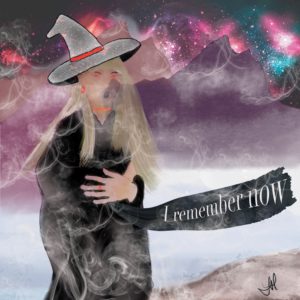 Diane: You are a psychotherapist. On your website you say that psychology and creative writing = storytelling alchemy. Can you expand on this?
Diane: You are a psychotherapist. On your website you say that psychology and creative writing = storytelling alchemy. Can you expand on this?
Laraine: I think that every book is bringing a gift to its writer. Is the writer able or willing to accept that gift? Well, that’s another story. Usually, the gift involves the writer having to change. Having to let go of a belief that’s not working anymore. Having to forgive (self or others). Having to make a decision. I believe that our books (and whatever art form we work in) is first a part of our own medicine. We have to take that medicine before we can complete the book that can go on to become medicine for someone else. And this is true for any genre. Sure, trade nonfiction can have a clear “medicine” – helping someone gain financial clarity, for example. But novels, stories, poems—they also contain medicine. Book coaching is not therapy, but it is very helpful, in my role as a book coach, to be able to understand the challenging psychology behind writing a book, and to be able to help the writer find their own way forward. Just understanding how to write comments that are helpful and also ‘nudging’ in a way that each different client can hear requires all my training in communication with clients.
“I Can Practice. I Can ‘Undo’. I Can Erase. I Can Decide I Want to Try a Different Technique”
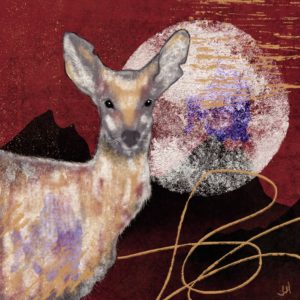 Diane: Creating visual art is also a big part of who you are—what is Procreate and how do you use it?
Diane: Creating visual art is also a big part of who you are—what is Procreate and how do you use it?
Laraine: Procreate is just a drawing app for the iPad. It’s like Adobe Illustrator, except you can draw directly in it with your Apple Pencil. (I know you can draw directly in Adobe Illustrator too, but unless you also have a drawing pad like a Wacom tablet, it’s not the same tactile feel) I also find Procreate much more intuitive than Adobe’s suite of programs.
You can export files in any format you might like, so you can export to Illustrator to make vector art, if you wanted to. You can set up files in any kind of print-ready format you might need, and then it’s all up to you what you want to make. What medium do you want to work in? Watercolor? Oil? Pastels? Graphite? Airbrush? There are brush sets (SO MANY BRUSH SETS!) that help you create textures and tones. You can import elements to create collages. You can import background textures to mimic canvases. I am pretty sure I only understand a small fraction of what it does. But I love it!
It doesn’t draw for you. I can’t just press “cat” and have it make a cat. J But it does allow you to infinitely experiment without having to purchase expensive art supplies and have all the space you’d need to create “analog.” It brought drawing back to me. I can take the iPad anywhere. I can practice. I can ‘undo’. I can erase. I can decide I want to try a different technique. And it’s all in one space with no waste and no additional expense. I know there are people who don’t consider digital art to be art, but I see it as just another medium to explore. You can do things digitally that you cannot do analog, and vice versa. It brings me a lot of joy, and I’m grateful that I found my way back to art.
“Now, in My Menopausal Glory, I Do What Feels Good and What Brings Me Joy”
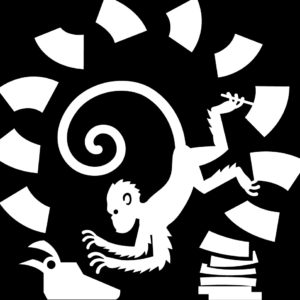 Diane: When do you decide to write vs. create visual art? What does creating visual art open up for you that writing may not?
Diane: When do you decide to write vs. create visual art? What does creating visual art open up for you that writing may not?
Laraine: I think it’s the tactile piece. I don’t handwrite anything anymore, but with drawing, I’m able to go back to that circular motion with my hands that’s quite soothing to the nervous system. I have always loved art. I was going to be an art major for a moment. I love how a single image can say much more than an essay, and I find that images get to the heart of expression in a way that language doesn’t—or at least a faster way. I’m obsessed right now with pairing art and words to tell stories. If you’d have told me this a decade ago, I would have laughed. Now, in my menopausal glory, I do what feels good and what brings me joy.
Diane: You have a special commitment to women over 40. Can you talk about why and a bit about your Fierce Monkey coaching? Memento Mori? What about Hags on Fire?
Laraine: I realized when I started my book coaching business, Fierce Monkey Coaching, that I could work with whoever I wanted to. I didn’t have to take everyone who showed up, unlike teaching at a community college, which I have done for decades. I know who my people are. I know who I work best with and with whom I can have the most fruitful relationships. It’s about finding audience. 40 is somewhat arbitrary, but it has more to do with my own age. I’ll be 54 August 5. The farther away I am from someone younger than me, the less I feel I am able to help them. Also, I’m very interested in people who the culture has written off as done. I don’t think women are even close to done at midlife and later.
“I Am Keeping My Book Coaching Business Going and Continuing to Grow That. I Love That Work”
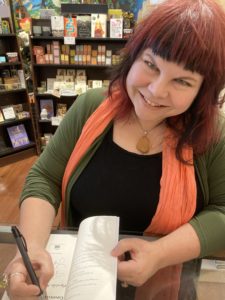 Diane: What are you working on now? What’s next?
Diane: What are you working on now? What’s next?
Laraine: I’m working on retiring from the college. Everything for the next two years is about creating that reality by 2024. This means I am teaching overloads and summer school and all the things so that I can increase my pension. This also means that I’m not doing some other things that are important to me. I need to leave higher ed for my own sanity. I’m not willing to sacrifice all the years I’ve put into it. If I walk away today, I lose most everything and will have to find new, full time employment. If I can stick it out and increase my withholdings and buy back my adjunct years of service, then I can have a liveable pension that can support the things that are next.
I have had to make some decisions about what to pause for now. I will be pausing Hags on Fire, my online ‘zine for women writing about perimenopause, menopause and aging, and I am pausing Memento Mori because I am already teaching too many classes through the college to be able to do justice to what I want to do there. I will create classes there when I have retired. I am keeping my book coaching business going and continuing to grow that. I love that work and it is a good return on investment for my time.
There is a speculative memoir haunting me about my maternal grandmother. It’s not yet the time for it. But it will be.
I know I will be on the lookout for that memoir!
If you’d like to learn more about Laraine, please visit her website!
And if you’d like to read the review I wrote of Constellations in Barrelhouse, here it is!
As always, I’d love to hear from you. Write a comment or send me an email.
See you soon!
XOXO
Diane

If You Know Another Amazing Woman (Or Person Of Any Gender!) Who Might Like To Join Us At WomanPause, Please Forward This Link: WomanPause
For one-on-one support in uncovering your voice on the page, please consider working with me! I’d love to join you on your journey!



I love the idea of the book I am writing being my own medicine before it can be medicine for anyone else! That feels so true. Great interview.
Isn’t that a wonderful way to look at it? I just love Laraine’s perspective! Thanks so much for sharing!!